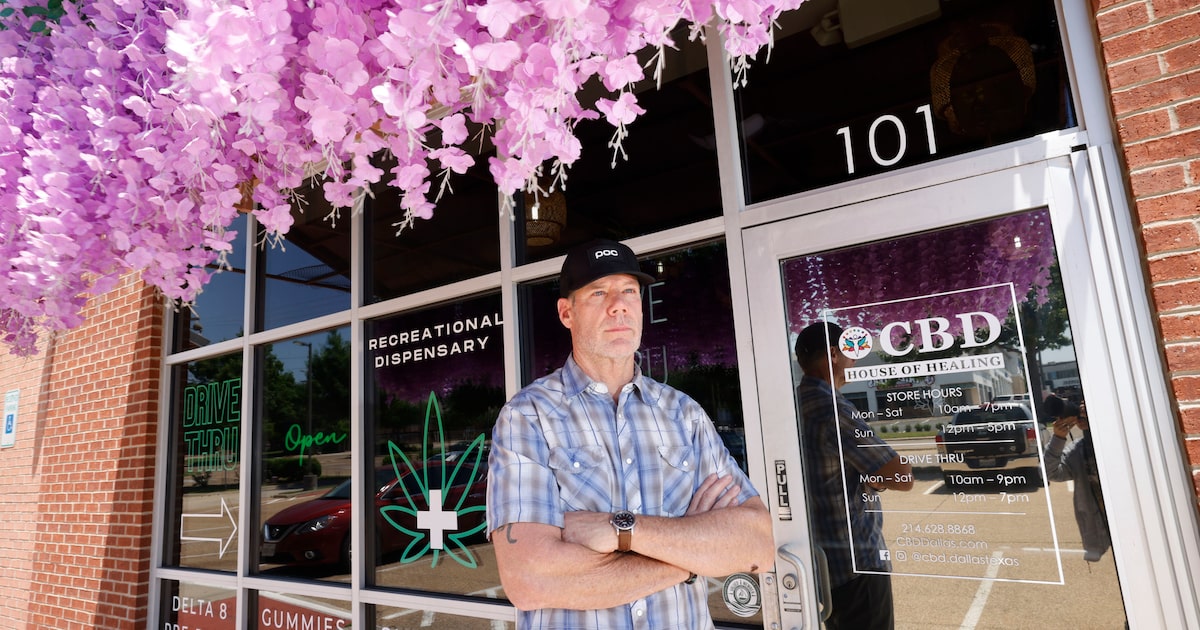A new ban on hemp-derived THC products could be a devastating blow for thousands of Texas businesses.
Hundreds of shops in the industry could see closures in the North Texas area, according to Jay Maguire, a consultant for the market. That’s after the Texas House voted 87-54 to approve the ban of hemp-derived tetrahydrocannabinol — or THC, the psychoactive ingredient in marijuana – that are offered in gummies, edibles and other consumables.
“There are a lot of businesses that specialize in the sale of hemp products,” said Heather Fazio, director, Texas Cannabis Policy Center. “They’ve been operating for years now, and this change will absolutely devastate their livelihood.”
While the future of the growing sector hangs in the balance, many businesses are bracing for the threat that bans the sale of products that have helped fuel the rise of the shops that dot retail areas across Dallas-Fort Worth and the state. At stake is an industry valued at billions of dollars and affects more than 8,500 license holders in vape stores, coffee shops, convenience stores and other venues.
While the proposed ban carves out an exemption for non-intoxicating hemp products that don’t include THC – such as the popular cannabidiol (CBD) – it shuts down the popular THCA and delta-8 consumables.
The Senate passed the ban in March. The legislation now goes back to the Senate to approve minor changes before it goes to Gov. Greg Abbott’s desk. Supporters of the ban say the retailers sell products that are often illegally high in THC and accuse them of selling to minors.
Lt. Gov. Dan Patrick, after visiting vape shops hoping to find underage customers, has been a key backer of the new restrictions, saying in March that retailers should close voluntarily or the state would do it for them.
Yet opponents said that prohibition would be a disappointing overreach that defies Texas’ pro-business values and allows residents access to life-changing products.
Rep. Ron Reynolds, D-Dallas, was one of those who pushed back against the ban calling it “outrageous” in one X post.
“We know that the hemp industry, like many others, can have its share of bad actors,” Reynolds said. “That’s why proper testing, legally, and consumer protections are critical.”
The market isn’t small, even by Texas standards. The total estimated revenue derived from businesses involved in the hemp-derived cannabinoid industry in the state is approximately $5.5 billion, according to a report by Whitney Economics. The industry’s retail sector alone generates $4.3 billion.
In addition, the hemp industry employs over 53,000 workers, receiving $2.1 billion in wages, the report said.
Tracy Bowen, manager of CBD House of Healing, shows products at his shop, Friday, May 23, 2025, in Dallas. (Chitose Suzuki / Staff Photographer)
At CBD Dallas House of Healing, the store in the eastern side of the city is under threat, manager Tracy Bowen said.
“If Gov. Abbott signs this bill, we cannot function as a business,” Bowen said.
The business, which has about a half-dozen employees, has seen rapid growth. Last year, it added over 1,400 customers. Already, those clients have been showing their concern about the legislation as well.
“I already have tons of customers that are tripling and quadrupling their purchases because they’re terrified that they’re not going to be able to get these products anymore,” Bowen said.
Maguire said it’s shaking up the industry in the Lone Star state — and that will have an effect on the economy. He said he sees the market providing a “wellness product” that’s now in jeopardy.
“I get that question every day from retailers that call me, ‘Should I close? Should I take the stuff off my shelves?,’” Maguire said. “ And my answer is, ‘I don’t know what your situation is, but you should reduce your exposure immediately if this law is signed.”
Cornbread Hemp, a Kentucky-based supplier of products for the industry, said it gets more than 7% of its sales nationwide from Texas, as it find traction with customers who need help with areas such as pain or better sleep, according to co-founder Jim Higdon.
“People who are looking for a natural sleep remedy are women over 60, and that’s the customer that we serve in Texas,” Higdon said.
The issue over these products has raged in Texas since low-potency hemp and hemp products, containing less than .03% delta-9 THC, were legalized through a federal loophole in 2019 in order to boost agricultural production. While there may be some carve-out in the new legislation for some elements, that doesn’t mean there‘s much there for retailers.
“So now businesses are going to have to decide: Is it worth it to create a whole business around selling isolated CBD or CBG?” Fazio said. “Frankly, there isn’t much of a market for it, and CBD, when it does work, it’s because it works in concert with all of the other minor cannabinoids within the plant.”


